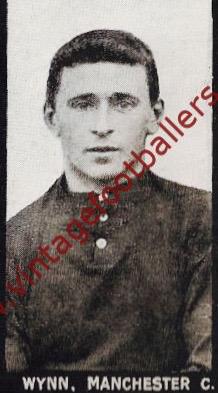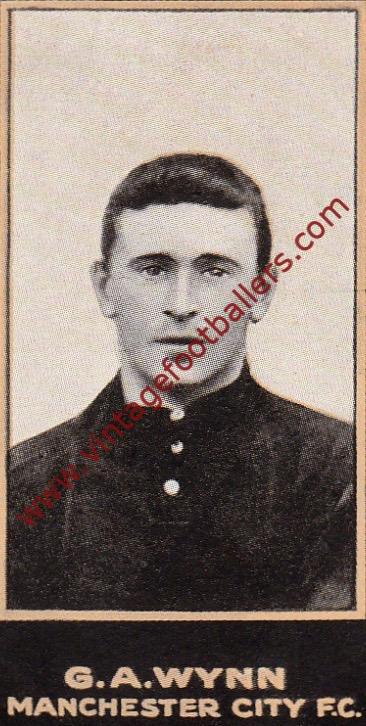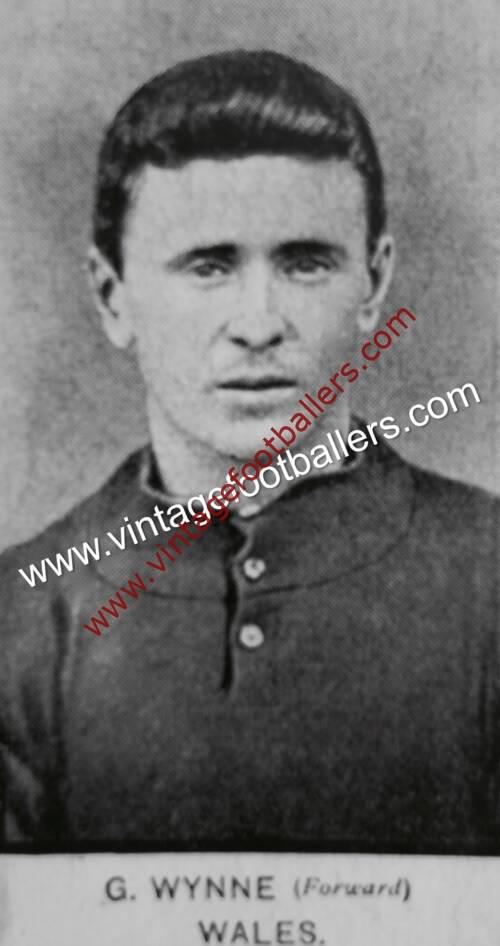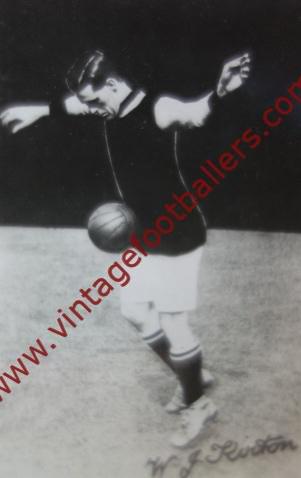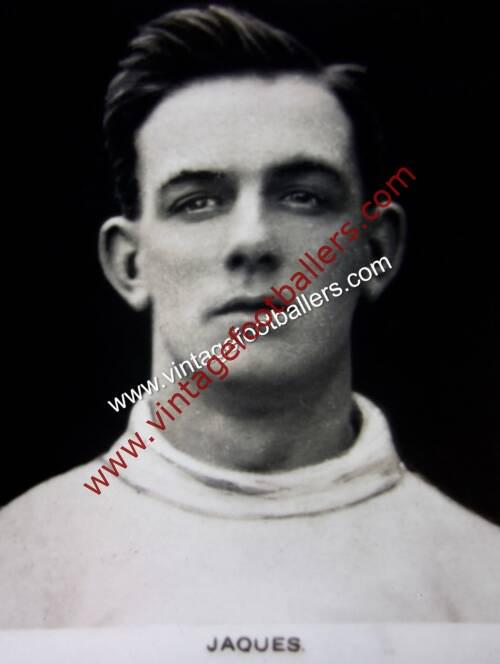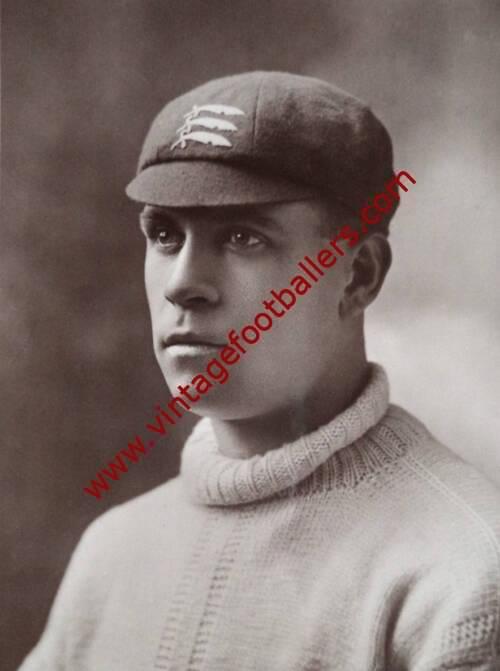Please choose your photo size from the drop down menu below.
If you wish your photo to be framed please select Yes.
Note: 16″x 20″not available in a frame.
Images can also be added to accessories. To order please follow these links
£8.95 – £49.95
Please choose your photo size from the drop down menu below.
If you wish your photo to be framed please select Yes.
Note: 16″x 20″not available in a frame.
Images can also be added to accessories. To order please follow these links
Treflach, near Oswestry, Shropshire born inside forward George Wynn began his football career with Pant Glas in 1905 and played for Chirk in 1906 and Oswestry United in 1907, scoring as the club lifted the Welsh Cup in the 1907 Final with a 2-0 victory over Whitchurch at The Racecourse Ground, Wrexham, before joining Wrexham, who were playing in the Football Combination at the time, a few weeks later. Wynn made his international debut on 1st March 1909 in a Home Championship match against Scotland at The Racecourse Ground, which Wales won 3-2. He then scored his only international goal in a 3-2 victory over Ireland, also at The Racecourse. Several league clubs were believed to be interested in signing Wynn, and in May 1909, he moved to Second Division Manchester City for £250.
Wynn made his Football League debut on Christmas Day 1909 in a 2-0 defeat at Bradford Park Avenue. He scored his first goal for the club two days later against Grimsby Town in a 2-0 win at Hyde Road. During the season he scored 12 goals in 24 appearances as Manchester City won the Second Division Championship. In each of the next three seasons he was the club’s leading goalscorer with 9 (from only 20 games which included a hat-trick in their season opening fixture, a 5-1 win over Bury), 18 (including a hat-trick against Sheffield Wednesday in April 1912) and 16 goals respectively.
He lost his regular place in the City team from October 1913, and won his last cap of eleven for Wales in a 2-0 defeat to England at Ninian Park in March 1914, but he only appeared infrequently for City until the suspension of peacetime football due to the onset of the First World War in 1915, which certainly shortened Wynn’s playing career. He scored nine times in 30 wartime games for City before returning to Manchester City but had a difficult service as a soldier on the Western Front.
Private 205527 Wynn joined the 2/5th Battalion of the Lancashire Fusiliers during the First World War but would later transfer to the 8th Lincolnshire Regiment (Service No. 42701). Wynn was to serve on the Western Front and would also play divisional football on a number of occasions. On 16 April 1918, the Liverpool Echo published a letter from the Welshman, which read:
“Thanks very much for offering to send a paper. I would prefer the “Liverpool Football Echo.” I met Charlie Griffiths (who played outside left for Oswestry); he was in our camp for about a week, and played in a couple of matches for our division. We won both matches. I have had a few games here, and have managed to score one or more in each, five being the most. I’m playing centre-forward for our division. I don’t suppose you see many games where you are. If you happen to know a Mr. Penry Jones where you are give him my kind regards. He was a member of the Welsh Football Association when I played, and is a good sport.”
On 3 September 1918, the same newspaper reported that Wynn had been shot in the left leg and had received further wounds following shell burst. One week later, it published a letter from Wynn, which read:
“The commencement of the football season recalls different personalities, and as I have always followed up your paper in sport. I hope you have another successful season. I have been finishing what should have been the close season up in a Northern hospital, though in a different way than other times. Still, I was far luckier than some of my pals, so I mustn’t grumble. A shell burst amongst a dozen of us, killing three or four and wounding the rest. I had a bullet through the left knee and a couple of shell wounds just below the calf, but they are not serious; and I hope to be as fit as ever again shortly, and hope to play against Liverpool – AND BEAT THEM. We had some good games in France, and our were in the final for the Divisional Cup, which was expected to be played this last couple of months, for which there were two sets of medals. There is great interest taken in these matches and I was looking forward very much for one of those medals; but a bigger match came off, with the result that I got bowled over. It was no use protesting, so I GOT CARRIED OFF THE FIELD. All the best to all friends.”
Following the Armistice, Wynn returned to Britain and was to resume his career in professional football after finally being demobilised in 1919 and on the resumption of competitive football and played four times for Manchester City in the early part of the season, his final game for them coming in a match against Oldham Athletic on 8th September 1919. In total he scored 59 goals in 127 appearances for The Citizens.
He appeared for Wales in both Victory internationals, the unofficial international matches between Wales and England to mark the end of The Great War, including joining former City wartime teammate and long time fellow international Billy Meredith on the scoresheet as the hosts beat England 2-1 in Wales’ Victory International at Ninian Park on 11th October 1919.
Wynn was then sold to Second Division Coventry City for £300 in November 1919. At Coventry he made a total of 26 appearances, scoring three times, before joining Llandudno Town late in 1920. He returned to the Football League when he joined Halifax Town in the summer of 1921 but he only made a solitary appearance for The Shaymen in a 4-1 defeat at Walsall in January 1922 before joining Midland League Mansfield Town later the same year, bringing his career to an end with Cheshire League side Mossley whom he joined in 1923 and where he scored 25 goals in 61 games before his eventual retirement.
| Weight | N/A |
|---|
